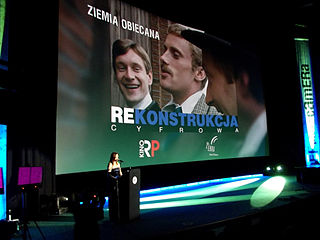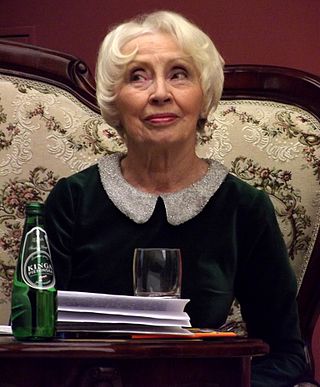Anna Nehrebecka | |
|---|---|
 | |
| Born | 16 December 1947 |
| Occupation | Actress |
| Years active | 1969 –present |
Anna Nehrebecka-Byczewska (born 16 December 1947 in Bytom) is a Polish film actress and politician. [1]
Anna Nehrebecka | |
|---|---|
 | |
| Born | 16 December 1947 |
| Occupation | Actress |
| Years active | 1969 –present |
Anna Nehrebecka-Byczewska (born 16 December 1947 in Bytom) is a Polish film actress and politician. [1]
She was born Anna Wojciechowska. Her married surnames are Nehrebecka and Byczewska. In 1969 she graduated from the Theatre Academy in Warsaw, her film debut took place in 1967. In 1969 she became an actress of the Polish Theatre in Warsaw. She acted in many theatre, cinema and TV productions, classic as well as contemporary. She created poetry recitation programmes in radio and television. The series started in the 1970s, and included mainly poetry of Stanisław Baliński, Zofia Bohdanowicz, Ryszard Kiersnowski and Beata Obertyńska.
During the Martial Law in Poland in 1981-1983 she acted in churches and private apartments. She performed poetic concerts in Europe, Australia, New Zealand and in the United States.
She starred in movies produced in France and Hungary. She also appeared in an Albanian movie by Kujtim Çashku, "Kolonel Bunker" where she played one of the main roles - the Polish wife of an Albanian officer.
Anna Nehrebecka is married to the Polish diplomat Iwo Byczewski. [2]

The history of cinema in Poland is almost as long as the history of cinematography, and it has universally recognized achievements, even though Polish films tend to be less commercially available than films from several other European nations.

The Leon Schiller Polish National Film, Television and Theatre School in Łódź, commonly known as Łódź Film School is a Polish academy for future actors, directors, photographers, camera operators and television staff. It was founded on 8 March 1948 in Łódź (Lodz).

Anna Maria Mucha is a Polish actress. She is best known to Western audiences as Danka Dresner in Steven Spielberg's 1993 film Schindler's List. In Poland, she is known for her regular role in the soap opera L for Love (2003–present).

Korczak is a 1990 black-and-white biographical war film directed by Andrzej Wajda and written by Agnieszka Holland, about Polish-Jewish humanitarian Janusz Korczak. An international co-production between Poland, Germany and the United Kingdom, it stars Wojciech Pszoniak as Korczak, with Ewa Dałkowska, Teresa Budzisz-Krzyzanowska, Marzena Trybala, Piotr Kozlowski, Zbigniew Zamachowski and Jan Peszek.

Kujtim Çashku is an Albanian film director and screenwriter who has won numerous awards at international film festivals, including the Critics Prize at the 1996 Bastia Mediterranean Film Festival and the UNESCO Award at the 1998 Venice Film Festival for Colonel Bunker, the Best Screenplay Award, the FIRESCI Prize and the Silver Pyramid at the 2005 Cairo International Film Festival as well as the Bronze Palm at the Valencia Festival of Mediterranean Cinema for The Magic Eye, and the CEI Award at the Trieste Film Festival for his "brave commitment to the development of Albanian cinema". He is the founder and director of Tirana's Marubi Film & Multimedia School, the first film university in Albania, as well as the supervisor of OraFilm, Albania's first film production company, and founder-organizer of Albania's first Human Rights Film Festival (IHRFFA).
The 2003 Polish Film Awards ran on March 15, 2003. It was the 5th edition of Polish Film Awards: Eagles.
The 2006 Polish Film Awards took place on 27 February 2006. It was the 8th edition of Polish Film Awards: Eagles.

The Polish Academy Life Achievement Award is an honorary Polish Film Award bestowed by the Polish Film Academy for outstanding contributions to the cinema of Poland.

Warsaw City Council, officially the Council of the Capital City of Warsaw is a unicameral governing body of the city of Warsaw, the capital of Poland.

Anna Polony is a Polish actress and theatre director. She is former Prorector of the Academy of Dramatic Arts in Kraków. The media dubbed Polony 'the First Lady of Polish Theatre' or 'the Dame of the Polish Theatre".

Krystyna Jolanta Janda is a Polish film and theatre actress, director, and singer. She is best known internationally for playing leading roles in several films by Polish film director Andrzej Wajda, including Man of Marble and Man of Iron. She is widely considered one of the most popular and successful Polish actresses of her generation and an icon of Polish cinema.

Jerzy Duszyński was one of the most popular actors in a post-war Poland. He starred in a number of film productions as well as theatrical plays.
Start International Polska is a Polish dubbing and voice-over translation studio based in Warsaw.
Zespół Filmowy "X" is a Polish film production studio, inaugurated on New Year's Day, 1972. The studio's formation was the brainchild of acclaimed Polish director Andrzej Wajda, who served as the Artistic Director for the duration of the studio's existence.
The Polish Film Academy is a professional honorary organization dedicated to the advancement of the arts and sciences of motion pictures.
KADR is a major Polish film production and distribution company, founded in 1955 and still producing films as of 2016. Between its founding and 2003, KADR released 150 films in total, including many classics of Polish cinema.

The King of Warsaw is a Polish crime series directed by Jan P. Matuszyński, based on a 2016 novel of the same name by Szczepan Twardoch. It was produced at the request of Canal+, and premiered on November 6, 2020.